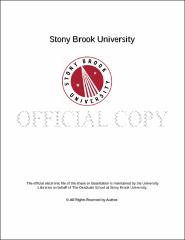| dc.identifier.uri | http://hdl.handle.net/11401/76874 | |
| dc.description.sponsorship | This work is sponsored by the Stony Brook University Graduate School in compliance with the requirements for completion of degree. | en_US |
| dc.format | Monograph | |
| dc.format.medium | Electronic Resource | en_US |
| dc.language.iso | en_US | |
| dc.publisher | The Graduate School, Stony Brook University: Stony Brook, NY. | |
| dc.type | Dissertation | |
| dcterms.abstract | The subject of the proposed dissertation is the oeuvre of the film director, screenwriter, and producer Darren Aronofsky in the period 1998-2014. Chronologically speaking, Aronofsky's themes can be traced along the following trajectory of dualities: obsession and acceptance (π , 1998), addiction and reality (Requiem for a Dream, 2000), denial and acceptance (The Fountain, 2006), faded perfection and resignation (The Wrestler, 2008), artistic perfection and reality (Black Swan, 2010), idealization and reality (Noah, 2014). Aronofsky's filmography is discussed with respect to his style and the themes of his films. His films deal with existential questions facing humanity, providing artistic counterparts to well-known philosophical works. Hence, the themes and the questions arising from his films are discussed in relation with relevant philosophical writings. In addition, Aronofsky's filmic sensibility and his treatment of his themes demonstrate the influence of and shared sensibility with several notable directors. In particular, his inclination towards storytelling, involving characters that are caught up in obsessions that lead to extraordinary situations, shows affinity with both Kubrick's and Spielberg's work, despite their opposing sensibilities. Aronofsky's films extend the genre of melodrama by coupling complex characters and their transformations with ambiguous endings. Despite working in different times and different cultures, the melodramatic tone brings him close to Fassbinder, who redefined the melodrama genre through the presentation of human psychology, the elasticity of moral convictions and the elusiveness of satisfying desire. The Appendix to this manuscript includes a transcript of the conversation I had with Aronofsky on December 2, 2013. | |
| dcterms.available | 2017-09-20T16:51:21Z | |
| dcterms.contributor | Uroskie, Andrew V. | en_US |
| dcterms.contributor | Luterbie, John | en_US |
| dcterms.contributor | Patterson, Elisabeth | en_US |
| dcterms.contributor | Gabbard, Krin. | en_US |
| dcterms.creator | Skorin-Kapov, Jadranka | |
| dcterms.dateAccepted | 2017-09-20T16:51:21Z | |
| dcterms.dateSubmitted | 2017-09-20T16:51:21Z | |
| dcterms.description | Department of Art History and Criticism. | en_US |
| dcterms.extent | 150 pg. | en_US |
| dcterms.format | Application/PDF | en_US |
| dcterms.format | Monograph | |
| dcterms.identifier | http://hdl.handle.net/11401/76874 | |
| dcterms.issued | 2015-08-01 | |
| dcterms.language | en_US | |
| dcterms.provenance | Made available in DSpace on 2017-09-20T16:51:21Z (GMT). No. of bitstreams: 1
SkorinKapov_grad.sunysb_0771E_12113.pdf: 1561026 bytes, checksum: f0c3e6efe3d1f6292f9edcb42b9c2b28 (MD5)
Previous issue date: 2014 | en |
| dcterms.publisher | The Graduate School, Stony Brook University: Stony Brook, NY. | |
| dcterms.subject | Film studies | |
| dcterms.subject | Darren Aronofsky, Film and Philosophy, Film studies, Melodrama | |
| dcterms.title | On Darren Aronofsky's Filmography from 1998 to 2014: Obsessions, Addictions, and the Pursuit of Perfection | |
| dcterms.type | Dissertation | |

